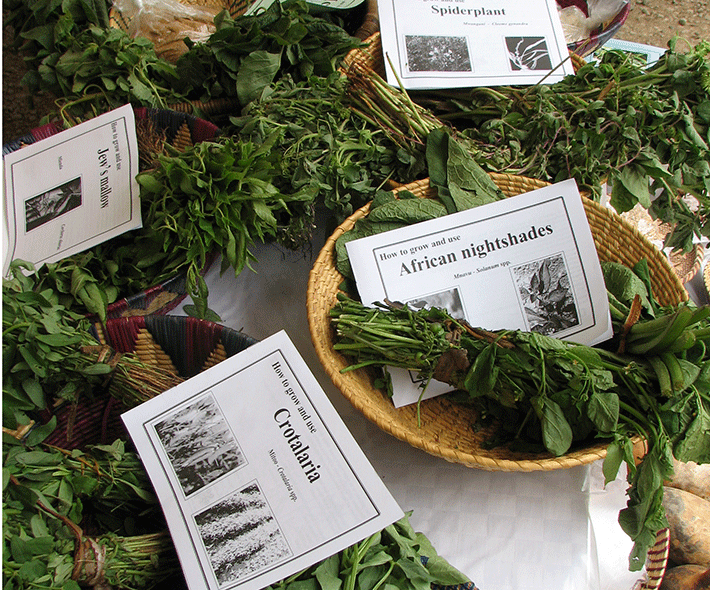Bioversity International featured at Africa’s biggest gathering of nutritionists

Bioversity International showcased its research addressing the lack of important micronutrients in African diets at Africa’s biggest gathering of nutritionists in Addis Ababa.
The African Nutrition and Epidemiology Conference (ANEC), held every two years, is Africa’s biggest gathering of nutritionists. This year, the conference took place in Addis Ababa, on 1-4 October and the theme was: “Multi-stakeholder nutrition actions in Africa: translating evidence into policies and programs for impact”. Bioversity International was widely represented with nine of its scientists attending and organizing panel discussions and presentations on mainstreaming agrobiodiversity in food systems to address the prevalence of monotonous, staple-heavy diets, lacking in important micronutrients, across the African continent.

Bioversity International also co-sponsored* a symposium entitled Mainstreaming Agrobiodiversity in African food Systems for Healthy and Sustainable Diets as a platform for discussion and gathering of evidence on traditional and indigenous agrobiodiversity, which could stimulate African food systems to improve nutrition.
More than 100 participants attended the symposium, where Victor Wasike – Bioversity’s Kenya coordinator of the Biodiversity for Food and Nutrition (BFN) Project – delivered a keynote on the nutritional value of indigenous crops. In Kenya, a BFN initiative is improving the diet quality in schools by ensuring indigenous vegetables are included in students’ lunches, five days a week. During this meeting, a display of snacks featuring neglected and underutilized species such as puffed millet and sorghum flavored with baobab and mango powder demonstrated how such nutritious foods could be mainstreamed.
A panel discussion followed featuring Beatrice Ekesa from Bioversity International Uganda, among others, addressing malnutrition in Africa, looking at various studies on food composition of traditional and indigenous crops and discussing best practices for mainstreaming such nutrient-dense foods to improve health across Africa.
From Bioversity International Kenya, two researchers presented on three initiatives across various districts in Kenya:
Julia Boedecker talked about using a food calendar as a tool to raise awareness on the seasonal availability of nutritious local foods, which is being put to use in northern Kenya to improve dietary diversity. She also demonstrated that the agricultural activities and nutrition education aimed to increase dietary diversity in Vihiga County, Kenya, resulted in an improved dietary diversity score among women and children.

Francis Odhiambo presented on indigenous knowledge systems. For populations living within marginalized areas, indigenous knowledge systems are key to nutrition communication and education. Odhiambo explained that successful nutrition interventions must be directed in a way that is easily understood by locals and they must include men, who are the primary household decision makers.
From Bioversity International Uganda, presentations centered on the role of fathers when it comes to child feeding in Uganda, and on multi-stakeholder participatory approaches to improve child feeding in rural Uganda and Tanzania. Deborah Nabuuma reiterated the need to engage fathers in interventions. Infant and young child feeding is highly inadequate in rural Uganda and Tanzania, with less than 20% of children 6-23 months receiving the minimum acceptable diet. Beatrice Ekesa presented results showing that multiple sectors should work together to reduce duplication of activities and capitalize on combined strengths such as access to resources, opportunities, skills, and knowledge for jointly identifying and solving problems.
Ekesa also discussed animal sourced foods, particularly in Rwandan households, where economic uncertainty often causes households to consume less animal sourced foods, which may negatively affect their diet. Household characteristics such as family size, asset ownership (land, livestock) and enhanced social capital positively influences expenditure on and consumption of animal sourced foods.

Molly Ahern presented research in Malawi and Zambia, where Bioversity International developed a dietary monitoring tool to measure changes, including seasonal changes, in food consumption of women of reproductive age. After one year of monitoring, results demonstrated that three food groups dominated women’s diets across target areas of both countries: staples, dark green leafy vegetables, and other vegetables such as tomatoes and onions. Other food groups such as flesh foods (mainly fish) and vitamin-A rich fruits and vegetables were highly seasonal, suggesting that improved processing and storage methods or diversified food varieties within these food groups could improve women’s diet diversity.
In addition to showcasing research, the conference allowed participants to network with other scientists, build new partnerships and stimulate future research ideas. The participants of the symposium committed to building a community of practice focused on agrobiodiversity for nutrition to further discussion and knowledge-sharing of evidence, policy influence, and programme implementation. Future research efforts need to be directed towards building a wider evidence base to influence policies, inform programmes, and raise awareness of agrobiodiversity if we want to achieve nutritionally adequate diets and sustainable food systems in Africa.
* The partners are Food and Agriculture Organization of the United Nations, International Union of Nutritional Sciences, A4NH
This research is part of the CGIAR Research Program on Agriculture for Nutrition and Health (A4NH) and is supported by CGIAR Trust Fund Donors.
